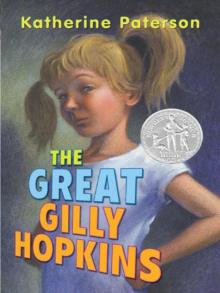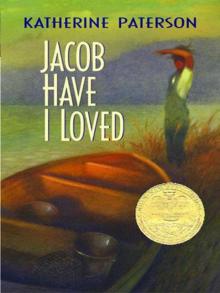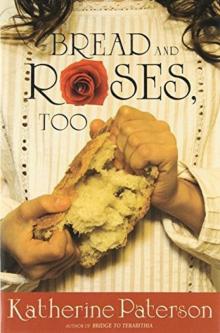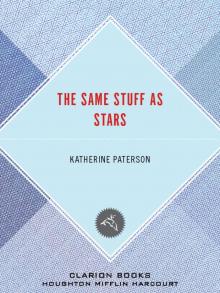- Home
- Katherine Paterson
The Great Gilly Hopkins
The Great Gilly Hopkins Read online
The Great Gilly Hopkins
Katherine Paterson
Dedication
For Mary
from her real
and adopted mother
with love
Contents
Dedication
Welcome to Thompson Park
The Man Who Comes to Supper
More Unpleasant Surprises
“Sarsaparilla to Sorcery”
William Ernest and Other Mean Flowers
Harassing Miss Harris
Dust and Desperation
The One-Way Ticket
Pow
The Visitor
Never and Other Canceled Promises
The Going
Jackson, Virginia
She’ll Be Riding Six White Horses (When She Comes)
Homecoming
About the Author
Also by Katherine Paterson
Credits
Copyright
About the Publisher
WELCOME TO THOMPSON PARK
“Gilly,” said Miss Ellis with a shake of her long blonde hair toward the passenger in the back seat. “I need to feel that you are willing to make some effort.”
Galadriel Hopkins shifted her bubble gum to the front of her mouth and began to blow gently. She blew until she could barely see the shape of the social worker’s head through the pink bubble.
“This will be your third home in less than three years.” Miss Ellis swept her golden head left to right and then began to turn the wheel in a cautious maneuver to the left. “I would be the last person to say that it was all your fault. The Dixons’ move to Florida, for example. Just one of those unfortunate things. And Mrs. Richmond having to go into the hospital”—it seemed to Gilly that there was a long, thoughtful pause before the caseworker went on—“for her nerves.”
Pop!
Miss Ellis flinched and glanced in the rear-view mirror but continued to talk in her calm, professional voice while Gilly picked at the bits of gum stuck in her straggly bangs and on her cheeks and chin. “We should have been more alert to her condition before placing any foster child there. I should have been more alert.” Cripes, thought Gilly. The woman was getting sincere. What a pain. “I’m not trying to blame you, Gilly. It’s just that I need, we all need, your cooperation if any kind of arrangement is to work out.” Another pause. “I can’t imagine you enjoy all this moving around.” The blue eyes in the mirror were checking out Gilly’s response. “Now this new foster mother is very different from Mrs. Nevins.” Gilly calmly pinched a blob of gum off the end of her nose. There was no use trying to get the gum out of her hair. She sat back and tried to chew the bit she had managed to salvage. It stuck to her teeth in a thin layer. She fished another ball of gum from her jeans pocket and scraped the lint off with her thumbnail before elaborately popping it into her mouth.
“Will you do me a favor, Gilly? Try to get off on the right foot?”
Gilly had a vision of herself sailing around the living room of the foster home on her right foot like an ice skater. With her uplifted left foot she was shoving the next foster mother square in the mouth. She smacked her new supply of gum in satisfaction.
“Do me another favor, will you? Get rid of that bubble gum before we get there?”
Gilly obligingly took the gum out of her mouth while Miss Ellis’s eyes were still in the mirror. Then when the social worker turned her attention back to the traffic, Gilly carefully spread the gum under the handle of the left-hand door as a sticky surprise for the next person who might try to open it.
Two traffic lights farther on Miss Ellis handed back a towelette. “Here,” she said, “see what you can do about that guck on your face before we get there.”
Gilly swiped the little wet paper across her mouth and dropped it on the floor.
“Gilly—” Miss Ellis sighed and shifted her fancy on-the-floor gears. “Gilly—”
“My name,” Gilly said between her teeth, “is Galadriel.”
Miss Ellis appeared not to have heard. “Gilly, give Maime Trotter half a chance, OK? She’s really a nice person.”
That cans it, thought Gilly. At least nobody had accused Mr. or Mrs. Nevins, her most recent foster parents, of being “nice.” Mrs. Richmond, the one with the bad nerves, had been “nice.” The Newman family, who couldn’t keep a five-year-old who wet her bed, had been “nice.” Well, I’m eleven now, folks, and, in case you haven’t heard, I don’t wet my bed anymore. But I am not nice. I am brilliant. I am famous across this entire county. Nobody wants to tangle with the great Galadriel Hopkins. I am too clever and too hard to manage. Gruesome Gilly, they call me. She leaned back comfortably. Here I come, Maime baby, ready or not.
They had reached a neighborhood of huge trees and old houses. The social worker slowed and stopped beside a dirty white fence. The house it penned was old and brown with a porch that gave it a sort of potbelly.
Standing on the porch, before she rang the bell, Miss Ellis took out a comb. “Would you try to pull this through your hair?”
Gilly shook her head. “Can’t.”
“Oh, come on, Gilly—”
“No. Can’t comb my hair. I’m going for the Guiness Record for uncombed hair.”
“Gilly, for pete’s sake…”
“Hey, there, I thought I heard y’all pull up.” The door had opened, and a huge hippopotamus of a woman was filling the doorway. “Welcome to Thompson Park, Gilly, honey.”
“Galadriel,” muttered Gilly, not that she expected this bale of blubber to manage her real name. Jeez, they didn’t have to put her in with a freak.
Half a small face, topped with muddy brown hair and masked with thick metal-rimmed glasses, jutted out from behind Mrs. Trotter’s mammoth hip.
The woman looked down. “Well, ’scuse me, honey.” She put her arm around the head as if to draw it forward, but the head resisted movement. “You want to meet your new sister, don’t you? Gilly, this is William Ernest Teague.”
The head immediately disappeared behind Mrs. Trotter’s bulk. She didn’t seem bothered. “Come in, come in. I don’t mean to leave you standing on the porch like you was trying to sell me something. You belong here now.” She backed up. Gilly could feel Miss Ellis’s fingers on her backbone gently prodding her through the doorway and into the house.
Inside, it was dark and crammed with junk. Everything seemed to need dusting.
“William Ernest, honey, you want to show Gilly where her room is?”
William Ernest clung to the back of Mrs. Trotter’s flowered housedress, shaking his head.
“Oh, well, we can see to that later.” She led them down the hallway to a living room. “Just sit down and make yourself at home, now.” She smiled all across her face at Gilly, like the “After” in a magazine diet ad—a “Before” body with an “After” smile.
The couch was brown and squat with a pile of cushions covered in graying lace at the far end. A matching brown chair with worn arms slumped at the opposite side of the room. Gray lace curtains hung at the single window between them, and beside the window was a black table supporting an old-time TV set with rabbit ears. The Nevinses had had color TV. On the right-hand wall between the door and the brown chair stood a black upright piano with a dusty brown bench. Gilly took one of the pillows off the couch and used it to wipe every trace of dust off the piano bench before sitting down on it.
From the brown chair Miss Ellis was staring at her with a very nonprofessional glare. Mrs. Trotter was lowering herself to the sofa and chuckling. “Well, we been needing somebody to rearrange the dust around here. Ain’t we, William Ernest, honey?”
William Ernest climbed up behind the huge woman and lay behind her back like a bolster pillow,
poking his head around from time to time to sneak another look at Gilly.
She waited until Mrs. Trotter and Miss Ellis were talking, then gave little W.E. the most fearful face in all her repertory of scary looks, sort of a cross between Count Dracula and Godzilla. The little muddy head disappeared faster than a toothpaste cap down a sink drain.
She giggled despite herself. Both of the women turned to look at her. She switched easily and immediately to her “Who, me?” look.
Miss Ellis stood up. “I need to be getting back to the office, Mrs. Trotter. You’ll let me know”—She turned to Gilly with prickles in her big blue eyes—“you’ll let me know if there’re any problems?”
Gilly favored Miss Ellis with her best barracuda smile.
Meantime Mrs. Trotter was laboriously hefting herself to her feet. “Don’t worry, Miz Ellis. Gilly and William Ernest and me is nearly friends already. My Melvin, God rest him, used to say that Trotter never met a stranger. And if he’d said kid, he woulda been right. I never met a kid I couldn’t make friends with.”
Gilly hadn’t learned yet how to vomit at will, but if she had, she would have dearly loved to throw up on that one. So, lacking the truly perfect response, she lifted her legs and spun around to the piano, where she proceeded to bang out “Heart and Soul” with her left hand and “Chopsticks” with her right.
William Ernest scrambled off the couch after the two women, and Gilly was left alone with the dust, the out-of-tune piano, and the satisfaction that she had indeed started off on the right foot in her new foster home. She could stand anything, she thought—a gross guardian, a freaky kid, an ugly, dirty house—as long as she was in charge.
She was well on the way.
THE MAN WHO COMES TO SUPPER
The room that Mrs. Trotter took Gilly to was about the size of the Nevinses’ new station wagon. The narrow bed filled up most of the space, and even someone as skinny as Gilly had to kneel on the bed in order to pull out the drawers of the bureau opposite it. Mrs. Trotter didn’t even try to come in, just stood in the doorway slightly swaying and smiling, her breath short from climbing the stairs.
“Why don’t you just put your things away in the bureau and get yourself settled? Then when you feel like it, you can come on down and watch TV with William Ernest, or come talk to me while I’m fixing supper.”
What an awful smile she had, Gilly thought. She didn’t even have all her teeth. Gilly dropped her suitcase on the bed and sat down beside it, kicking the bureau drawers with her toes.
“You need anything, honey, just let Trotter know, OK?”
Gilly jerked her head in a nod. What she needed was to be left alone. From the bowels of the house she could hear the theme song from Sesame Street. Her first job would be to improve W.E.’s taste in TV. That was for sure.
“It’s goin’ to be OK, honey. I know it’s been hard to switch around so much.”
“I like moving.” Gilly jerked one of the top drawers so hard it nearly came out onto her head. “It’s boring to stay in one place.”
“Yeah.” The big woman started to turn and then hesitated. “Well—”
Gilly slid off the bed and put her left hand on the doorknob and stuck her right hand on her hip.
Mrs. Trotter glanced down at the hand on the knob. “Well, make yourself at home. You hear now?”
Gilly slammed the door after her. God! Listening to that woman was like licking melted ice cream off the carton. She tested the dust on the top of the bureau, and then, standing on the bed, wrote in huge cursive curlicues, “Ms. Galadriel Hopkins.” She stared at the lovely letters she had made for a moment before slapping down her open palm in the middle of them and rubbing them all away.
The Nevinses’ house had been square and white and dustless, just like every other square, white, dustless house in the treeless development where they had lived. She had been the only thing in the neighborhood out of place. Well, Hollywood Gardens was spotless once more. They’d got rid of her. No. She’d got rid of them—the whole stinking lot.
Unpacking even just the few things in her brown suitcase always seemed a waste of time to Gilly. She never knew if she’d be in a place long enough to make it worth the bother. And yet it was something to fill the time. There were two little drawers at the top and four larger ones below. She put her underwear in one of the little ones, and her shirts and jeans in one of the big ones, and then picked up the photograph from the bottom of the suitcase.
Out of the pasteboard frame and through the plastic cover the brown eyes of the woman laughed up at her as they always did. The glossy black hair hung in gentle waves without a hair astray. She looked as though she was the star of some TV show, but she wasn’t. See—right there in the corner she had written “For my beautiful Galadriel, I will always love you.” She wrote that to me, Gilly told herself, as she did each time she looked at it, only to me. She turned the frame over. It was still there—the little piece of tape with the name on it. “Courtney Rutherford Hopkins.”
Gilly smoothed her own straw-colored hair with one hand as she turned the picture over again. Even the teeth were gorgeous. Weren’t girls supposed to look like their mothers? The word “mother” triggered something deep in her stomach. She knew the danger signal. Abruptly she shoved the picture under a T-shirt and banged the bureau drawer shut. This was not the time to start dissolving like hot Jell-O. She went downstairs.
“There you are, honey.” Trotter turned away from the sink to greet her. “How about giving me a hand here with this salad?”
“No.”
“Oh.”
Score a point for Gilly.
“Well”—Trotter shifted her weight to her left foot, keeping her eyes on the carrots she was scraping—“William Ernest is in the living room watching Sesame Street.”
“My god, you must think I’m mental or something.”
“Mental?” Trotter moved to the kitchen table and started chopping the carrots on a tiny round board.
“Dumb, stupid.”
“Never crossed my mind.”
“Then why the hell you think I’m going to watch some retard show like that?”
“Listen here, Gilly Hopkins. One thing we better get straight right now tonight. I won’t have you making fun of that boy.”
“I wasn’t making fun of that boy.” What was the woman talking about? She hadn’t mentioned the boy.
“Just ’cause someone isn’t quite as smart as you are don’t give you no right to look down on them.”
“Who’m I looking down on?”
“You just said”—the fat woman’s voice was rising, and her knife was crashing down on the carrots with vengeance—“you just said William Ernest was”—her voice dropped to a whisper—“retarded.”
“I did not. I don’t even know the stupid kid. I never saw him in my life before today.”
Trotter’s eyes were still flashing, but her hand and voice were under control. “He’s had a rough time of it in this world, but he’s with Trotter now, and as long as the Lord leaves him in this house, ain’t anybody on earth gonna hurt him. In any way.”
“Good god. All I was trying to say—”
“One more thing. In this house we don’t take the Lord’s name in vain.”
Gilly threw both her hands up in mock surrender. “All right, all right. Forget it.” She started for the door.
“Supper’s ’bout ready. How about going next door and getting Mr. Randolph? He eats here nights.”
The word No was just about to pop out of Gilly’s mouth, but one look at Trotter’s eyes, and she decided to save her fights for something more important. “Which house?”
“The gray one on the right.” She waved her knife vaguely uphill. “Just knock on the door. If you do it good and loud, he’ll hear you. Better take your jacket. Cold out.”
Gilly ignored the last. She ran out the door, through the picket gate, and onto the porch next door, stomping and jumping to keep warm. Bam, bam, bam. It was too cold for October. Mr. R
andolph’s house was smaller and more grubby-looking even than Trotter’s. She repeated her knock.
Suddenly the door swung inward, revealing a tiny shrunken man. Strange whitish eyes stared out of a wrinkled, brown face.
Gilly took one look and ran back to Trotter’s kitchen as fast as she could go.
“What’s the matter? Where’s Mr. Randolph?”
“I don’t know. He’s gone. He’s not there.”
“What d’you mean he’s not there?” Trotter began wiping her hands on her apron and walking toward the door.
“He’s gone. Some weird little colored man with white eyes came to the door.”
“Gilly! That was Mr. Randolph. He can’t see a thing. You’ve got to go back and bring him by the hand, so he won’t fall.”
Gilly backed away. “I never touched one of those people in my life.”
“Well, then, it’s about time, ain’t it?” Trotter snapped. “Of course, if you can’t manage, I can always send William Ernest.”
“I can manage. Don’t you worry about me.”
“You probably got Mr. Randolph all confused and upset by now.”
“Well, you shoulda warned me.”
“Warned you?” Trotter banged a spoon on the table. “I shoulda warned poor Mr. Randolph. You want me to send William Ernest?”
“I said I could manage. Good god!” At this, Trotter’s spoon went up in the air like a fly-swatter. “All right! I didn’t say it. Hell, a person can’t even talk around here.”
“A smart person like you oughta be able to think of a few regular words to stick in amongst the cusses.” The spoon went into the salad and stirred. “Well, hurry up, if you’re going.”
The little black man was still standing in the open doorway. “William Ernest?” he called gently as Gilly started up the steps.

 The Great Gilly Hopkins
The Great Gilly Hopkins Bridge to Terabithia
Bridge to Terabithia My Brigadista Year
My Brigadista Year Jacob Have I Loved
Jacob Have I Loved Parzival: The Quest of the Grail Knight
Parzival: The Quest of the Grail Knight Lyddie
Lyddie The Day of the Pelican
The Day of the Pelican Stories of My Life
Stories of My Life Bread and Roses, Too
Bread and Roses, Too The Same Stuff as Stars
The Same Stuff as Stars